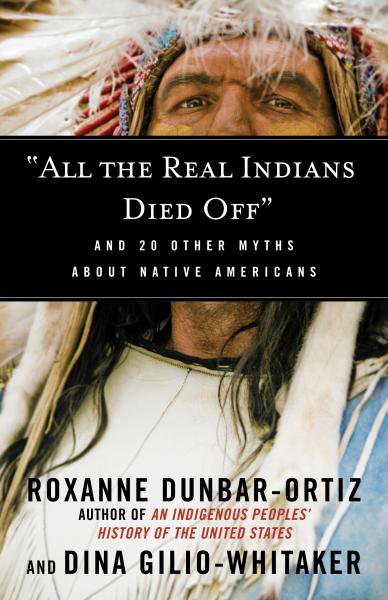Roxanne Dunbar-Ortiz image by Beacon Press
As a hard, hard rain fell outside, fifty or so people, including dozens of Native Americans, gathered inside Bluestockings, a small independent bookstore collective in New York City, to hear scholar, activist, and author Roxanne Dunbar-Ortiz.
The event on December 6 capped off a two-month, twenty-three-city book tour for All the Real Indians Died Off and 20 Other Myths About Native Americans, co-written with writer and researcher Dina Gilio-Whitaker. The tour overlapped with celebrations of Indigenous Peoples’ Day (also known as Columbus Day), the poll-defying presidential election, and the surreal Thanksgiving-week attacks against Native American water protectors in North Dakota.
The audience listened as the authors described their work to dismantle “state mythologies” about native peoples. Myths which, in Gilio-Whitaker’s words, “tell us more about the non-native mind than about native peoples.” Across the book’s 21 chapters, which can be read in any order, different analytical strategies come into play. In “Thanksgiving Proves the Indians Welcomed the Pilgrims” the authors turn to primary texts—Edward Winslow’s Mourt’s Relation and William Bradford’s Of Plymouth Plantation—and conclude that “neither of the accounts are detailed enough to surmise the familiar tale.”
In “Indians are Anti-Science,” the authors challenge the presumption that only “positivist, Cartesian-based Western systems” are science, pointing to Indigenous knowledge about astronomy, hydraulic engineering, agriculture/permaculture, transportation and road building, water navigation and vessels. The humble teepee is offered as an engineering feat: “It’s a very aerodynamic shape that can withstand high winds and snow loading, with strong convection heating and cooling properties.”
The book, published by Beacon Press on October 4, has already sold out its third printing, and is well into its fourth. Its success, no doubt gained some uplift from the wide wings of Dunbar-Ortiz’s “breakthrough” book—An Indigenous People’s History of the United States.
Its 236 pages convey our foundational American tragedy in unemotional, lucid, and economical writing. Her meticulous research and use of quoted material allows the record to speak powerfully for itself, as in the following passage by Andrew Jackson commenting on the crushing of the Muskogees (even those who had cooperated): “We bleed our enemies in such cases,” he stated, “to give them their senses.”
Read the dispatch on THE PROGRESSIVE
